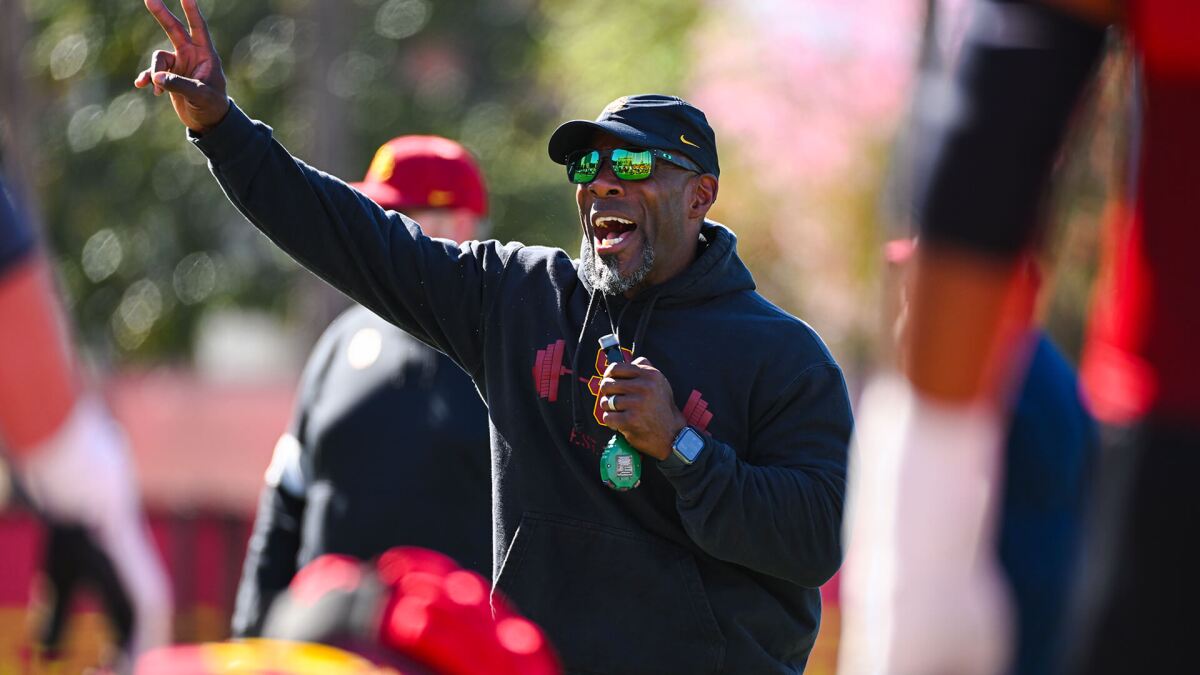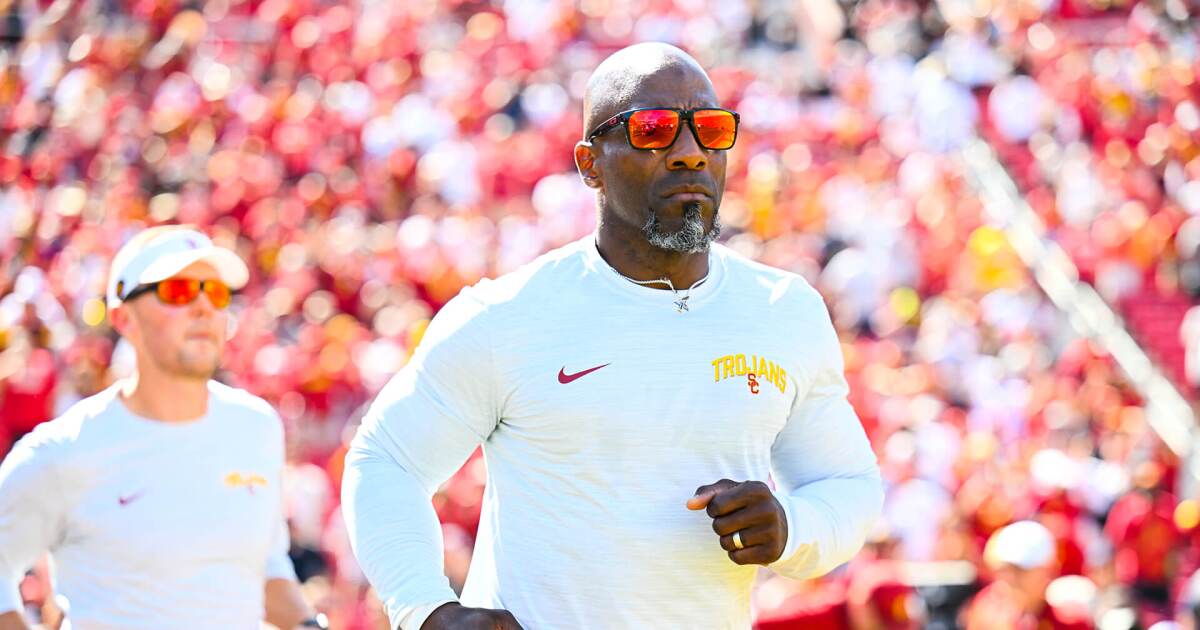USC strength coach Bennie Wylie teaching players toughness through life lessons
Everything Bennie Wylie would ever learn about toughness, every lesson he would one day try to pass down as USC strength and conditioning coach, started first with his mother.
Belvia Wylie was always grinding, working as many as three jobs in their small town of Mexia, Texas, just to make ends meet. Whatever it took to care for her three kids, whatever it took to protect them, she did without hesitation. She never complained either. Barely even raised her voice. “I never heard her use a cuss word my whole life,” Wylie says.
Everything would be OK, she always assured her youngest son, even when it wasn’t clear it would be. “She was an angel who walked the earth,” Wylie says now.
Belvia never wanted him to worry. But it was with her in mind that Wylie decided as a teenager he needed to get stronger. He had to protect her. So he started lifting weights and building his body, intent on being strong enough to defend his mother.
“I wanted to be the tough guy,” Wylie says. “I wanted to be strong enough to stand up to my dad.”
To the community, Bennie Sr. was a beloved, hard-working janitor at the local elementary school, the one who helped teach young students to tie their shoes. But at home, he was an alcoholic who could be physically and emotionally abusive. His mom, Wylie said, often took the brunt of that abuse.
In spite of the anger he harbored, he still wanted his father to be proud. “Some of my toughness, I know now, came because I wanted to do well for him,” Wylie said.
Their relationship wore on him, at one point leading him to move out of his family’s house for a period. But Wylie rarely let on to others about the tension in his home life. It wasn’t until years later, after Bennie Sr. died of a heart attack, that the community had any inkling about the complicated relationship with his father.
Most in their tight-knit town assumed at the time that Wylie’s sudden obsession with strength training stemmed from him being born premature and growing up smaller than most kids in the town.
“Everybody thought it was because I wanted to be good in sports because I was a little runt,” Wylie said.
But his friend, Joel Shoemake, could also sense there was more to it. He can still recall the day he and Wylie were allowed in the Mexia Junior High weight room for the first time. After a few reps bench-pressing the 40-pound bar, Joel was bored and ready to go, but Wylie stayed behind. It seemed at the time, Shoemake says now, “like something had changed in that moment.”
“Bennie fell in love with the idea of pushing himself and making himself stronger,” his friend continued. “It was something he could control.”
Wylie searched for other outlets. He worked as a carhop at Sonic. He became an Eagle Scout. He was on the student council. He was the band captain and the captain of Mexia’s football team. He sang in the all-state Texas Baptist Choir and spent hours every week at Mexia’s First Baptist Church, where Curt Pool, the church’s youth director, offered to listen whenever he needed to talk.
The trust Pool built just by listening was something he’d take with him to this day, even if he never let on to Pool how difficult life was at home.

USC strength and conditioning coach Bennie Wylie embraces his mom, Belvia Wylie.
(Courtesy of Bennie Wylie)
“Knowing what I know now,” Pool says, “he didn’t have a dad that he could talk to.”
With his parents working, he’d often spend several meals a week at the Shoemake house on the other side of town, where Jim and Brenda Shoemake grew accustomed to setting the table for the boy they referred to as their “third son.”
“My dad really took a shine to him and really stepped in to invest in him,” Joel Shoemake says. When Jim Shoemake died in 2013, Wylie served as a pallbearer at the funeral.
Other mentors would step into the void after he left Mexia with a football and track scholarship to Sam Houston State, where he would set on a path toward a career in strength and conditioning. Every stop brought its own lessons on how toughness was built. But each traced back to the same key ingredient.
“Trust,” Wylie says, “is essential.”
He paid close attention when Ben Pollard and his strength and conditioning staff at Sam Houston State set out to do every exercise, every lift, every sprint with him and his teammates during college. In his first job as an assistant strength coach with the Dallas Cowboys, Wylie watched how strength coach Joe Juraszek worked Emmitt Smith, Troy Aikman and Deion Sanders to the bone, only to have them thank him afterward.
“They trusted them. They had a relationship,” Wylie said. “The hard conversations, those were from love.”
And so, when he took over his first strength staff at Texas Tech, he set out to build that trust with his players, first and foremost. He did all the workouts with them. He tried to build relationships. It was in Lubbock that he struck up a particularly fruitful relationship with a 19-year old quarterback who would soon become a Red Raiders student assistant.
Nearly twenty years later, as a head coach, Lincoln Riley would bring Wylie with him on the plane from Norman, Okla., to Los Angeles, the morning after he accepted the job at USC.
Even before the plane landed, Wylie already had the benefit of a strong relationship with the Trojans’ star quarterback, who he worked with at Oklahoma.

USC strength and conditioning coach Bennie Wylie shouts instructions during practice.
(Courtesy of USC Athletics)
“We’d built a really good relationship,” Caleb Williams said. “When I wasn’t starting [at Oklahoma], I used to go into his office, and we used to just talk. I needed someone to talk to to get through what was going on at the time. I’d go sit in his office and we’d talk for an hour or an hour and a half sometimes. He’s a very relational person. He cares about us.”
As he’s set out to help turn around a culture at USC that, for years, lacked in toughness, Wylie has tried to do so with that care in mind. It’s why he runs and lifts alongside his players — so they know they’re in it together.
“Trust is earned, not given,” he says. “That’s where we build from. Then those hard things I ask them to do, toughness becomes just the constant decisions you keep making over and over again.”
Many years ago, Wylie came to the decision to forgive his father. With time, he says, emotional wounds healed. He came to understand, at least in part, that his father had done the best he could.
“At the end of the day, I think he just wanted us to be better than he was,” Wylie says.
Now, as he looks back on those days, he’s appreciative of what he went through, thankful for a mother’s fierce love and the guidance of so many who helped him along the way.
“I love it that I went through it because it helps me every single day with my current job and our current athletes,” Wylie said. “They all go through something. There’s always a story. There’s always something they’re dealing with.”
For all the latest Sports News Click Here
For the latest news and updates, follow us on Google News.

